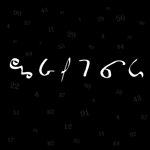THE LEGENDARY PINK DOTS
<< back to the Combined Discography
5 October 2010
US CD/2xLP ROIR RUS8317
24 November 2013
MP3 Redux self released on Bandcamp
- Russian Roulette
- Endless Time
- Leap Of Faith
- Radiation Day
- God And Machines
- No Star Too Far
- Someday
- Hauptbahnhof 20:10
- Ascension
LP-only bonus track:
10. Torchsong – Cubic Caesar Live
MP3-only bonus track (released on Bandcamp 24 November 2013):
11. Seeds of Faith
Credits
- Edward Ka-Spel – vocals, synthesizers, keyboards, devices
- The Silverman – synthesizers, keyboards, devices, percussion, vocals on “Someday”
- Erik Drost – electric, acoustic, bass and hawaiian guitars
- Raymond Steeg – mixing and engineering
2010. A new chapter for the Pink Dots, as they became a trio onstage, with Erik Drost returning to the fold with his unique, edgy and frequently devastating guitar style. At the end of 2009, Niels and Martijn had decided to move on and pursue their own personal projects, and in reality, the new path chosen seemed somehow inevitable. Call it unfinished business with Erik— the voyage remains fascinating.
Seconds Late was recorded in the space of 4 intense weeks. It remains an album that the band is fiercely proud of. — Edward Ka-Spel
Press Release
Unlike most acts of their vintage, The Legendary Pink Dots look forward. After more than 25 years, they continue to make compelling new music that is demanded by fans and maintains the high level of quality that set their careers in motion. Led by singer/songwriter Edward Ka-Spel and keyboardist/songwriter Phil “Silverman” Knight, the band continues to create their singular brand of modern psychedelia. Edward Ka-Spel’s lyrics breathe with a sagacity and cleverness only found in rock’s greatest writers. Their new album “Seconds Late For The Brighton Line” finds the band in familiar territory; pulsing Krautrock, dark and sinister pop and epic post-industrial soundscapes. The album invites the listener to put on head phones, close their eyes and embark on a technicolor journey. Stand out tracks include the epic electronic groove of “Russian Roulette”, the pretty naivete of “Someday” and the chilling goth-pop of “Endless Time.” The recent departure of long-time band members Niels Van Hoorn & Martijn De Kleer has left The Legendary Pink Dots to operate as a quartet. The new crew will embark on an extensive North American tour this Fall that celebrates the band’s 30th Anniversary. — ROIR
Reviews
Writing a review for the Legendary Pink Dots’ Seconds Late for the Brighton Line without access to a thesaurus would prove near impossible. Without one, a review for this release—the 27th in the band’s 30-year career—would break a record for the amount of times “eerie” and “ominous” are used in succession. An album of this caliber of brooding risks being written off as over the top, but in the hands of the Legendary Pink Dots,Seconds Late is more a refreshing return to pure goth atmospherics; in other words, it’s over-the-top done right.
As soon as vocalist Edward Ka-Spel begins intoning in “Russian Roulette” with his bare, rangeless voice, we know we are in for a doomy delight. “One is where I’d like to be, two is a crowd, three is where we have an argument that’s way too loud,” Ka-Spel counts off, perhaps checking off the years of the 21st century, anticipating an apocalypse on 2012 and its aftermath around 2018. The lyrics are malleable, but the pervading desolation of the sounds backing Ka-Spel heartily supports this interpretation.
Ka-Spel’s vocals, while lacking in range, prove themselves equally adaptable. When lyrics become extra surreal or as the music mellows, as on the almost sweet “Someday”, the vocals take on a Syd Barrett quality. There are more than a few moments scattered throughout Seconds Late that evoke the early incarnation of Pink Floyd, had that band’s output been fortified with synths and keyboards.
Many of the tracks on Seconds Late begin with minimal, or at least buried noises, blips, and frequencies, then throws in a startling sound or two before fading out. Sometimes, this tactic works wonders, a case in point being “No Star Too Far”, a nine-and-a-half-minute opus which begins with some spoken word lines from Ka-Spel and little else, then sees Phil “Silverman” Knight making fine use of his keyboard effects buttons, from “dentist’s drill” to “mutilated bagpipes”. “Radiation Day” pulls the vaguely clever trick of discharging what sounds like a stampede of CGI horses after Ka-Spel intones, “I will ride you like a stallion.”
Elsewhere, everyday noises integrate themselves nicely: while listening to the album during a bus ride, the beeping of the bus backing up seemed right in step with the chilly keyboard swirls and blips of “Leap of Faith”. This added noise also worked in making the song’s chorus of “Feeling so alone now / I really need a hug / Maybe more I’d clean the floor for your contaminated love” all the more unsettling. All this chilliness and post-apocalyptic worriment ultimately lead to “Ascension”, a 13-minute instrumental that, after so much synthy darkness, comes across as ethereal by comparison.
If we are to take Seconds Late as a concept album about life following the apocalypse, then the album also implies that, in such a world, whoever survives becomes their own God. Although the journey Ka-Spel and Knight take us on is barren, the payoff is fully worthy, no matter the amount of synonyms one relents to along the way. -Maria Schurr, PopMatters.com
***
I’m going to go out on a limb and assume that most readers aren’t looking for me to establish how Seconds Late for the Brighton Line fits into a 30-year, 40-odd-album career; realistically, this review is going to be about a band more than an album. Legendary Pink Dots are a delight: persistently eccentric, culty and batshit, their claustrophobic music acts as a sort of eternal padded cell for the dregs of 80s new wave and the kingdoms of 70s prog alike. Part of me itches to rattle off a stream of reference points, because the first few listens always feel like a strangely frustrating game of connect-the-dots. But that sort of dissection misses the point. The Dots’ sound seems innately ‘resolvable,’ but even if it is, it gets us no closer to their listenership. Although they evoke and build on selfserious anachronisms like Depeche Mode, they are not ‘Recommended If You Like’ Depeche Mode because a) they take it too far until b) clichés become a unique conglomerate and in the process c) unravel everything that drew anyone to Depeche Mode in the first place.
I’d suggest that a better career analog is an artist who sounds nothing like Legendary Pink Dots: Tom Waits. Like Tom Waits, LPDs will always be part of the 80s zeitgeist — they both sound instantly familiar. (Anyone know that Ween song “Right to the Ways and the Rules of the World”? This stuff is in your brain whether you want it there or not). Despite the fact that Tom Waits and LPDs are both arguably getting better at what they do with time and practice, their ‘best’ albums kind of have to be from the 80s or maaaybe early 90s. Most importantly, both have an infinite wellspring of inner darkness that their fans simply do not tire of. The best part is, if the abyss makes you giddy, if you dare to smile at their affected demons, that doesn’t turn it into a joke. This affords them both lots of quirky opportunities. If Pete Hammill ever sang, “Feeling so alone now/ I could really use a hug,” his fans would not be pleased; when Edward Ka-Spel’s plea pops up in “Leap of Faith,” it’s brilliant. It’s like a moment of tenderness from the bad guy in a Willow-era fantasy flick.
Lyrically, the Dots are not quite so relentless as they once were, but they’re still a swirl of surrealist doom ’n’ gloom (“Only taste the icing/ Never taste the cake/ You’ll drown in all that beauty/ Drown in all that beauty”) punctuated by double-take sketchballs: “Made my girl a promise/ She just turned nineteen.”(“Do the math” seems to be the album’s loose concept.) Ka-Spel’s anguished voice, winding through eerie half-steps apparently against its will, creates such a brutal/endless/Sisyphean journey that at times the album comes off as an extended suite. He and co-founder The Silverman apply their three-decade experience manipulating synthesizers into grotesque shapes to huge, Pit-and-the-Pendulum chord shifts.
The stellar “No Star Too Far” provides Seconds’ best example of what these guys are capable of accomplishing in nine minutes. The first three minutes are a gleefully abstract spoken-word piece backed by a sparse, reverbed-out sequencer and panning sighs. “Shout ‘destiny’! That always works.” Ka-Spel sounds darkly sarcastic, but then gets worked up: “It’s destiny! No one shirks their destiny!” It’s a confusing breaking point, and all of Ka-Spel’s frustration is funneled into a tiny, high-pitched synth that sounds like a hornet struggling for life. Even as blurry feedback and some kind of barely-discernable didgeridoo-slash-Gregorian loop pile up throughout the song, that synth keeps its seizure going, manically scribbling over itself, long past the point where it’s about notes anymore. And that’s the key: It seems like an extension or even mockery of virtuoso keyboard solos, but it pleases the ear more like a complex drone, dense non-melodies fused into sound shapes. It’s a fascinating document of how far the group’s audacity gets them.
“No Star Too Far” ushers in the album’s ‘creepily pretty’ section, which culminates in the 13-minute instrumental “Ascension,” a lovely-if-inapt piece of new age post-rock propelled by rain dance drum brushes. Most of the album doesn’t have anything as sublunary as percussion, though, and the result is that the listener effectively has to guess how far the free-floating synths are from the ground. This is an appropriate metaphor for both Legendary Pink Dots’ hypnosis and their crutch: their career doesn’t need to have any direction because no one knows where they are. The Dots can count on only their diehards being capable of situating Seconds Late For The Brighton Line relative to 2008’s Plutonium Blonde, but they can also count on their diehards not giving a shit. To be fair, I cannot imagine the crap they’d be turning out now if they’d broken through in the 80s like they ought to have — a broader fanbase would probably, for starters, demand they decide whether they’re ‘serious’ — so they’re better for their parallel-universe status. I can only say so much forSeconds, but as Legendary Pink Dots the band are a must-listen, it’s convenient that their career is porous with entry points. -Unicornmang; Tinymixtapes
***
Seconds Late For The Brighton Line is called the Legendary Pink Dots‘ 30th anniversary album, and while I can’t find anything specifically 30th anniversary about it, it does fit that title to some extent.
The album is not an overview of all their styles; in fact, it has a rather specific style, especially for an LPD album, but in other ways, it is extremely typical and in some ways, familiar. This is helped by the the fact that several of the songs were premiered during the band’s 30th anniversary tour. “Hauptbahnhof 20:10″ and “Russian Roulette” were both very impressive live, and do not sound much different on the album.
The band’s last album, Plutonium Blonde, worked with wry humor and a contrast between dreamy pastoral music and alienating electronic music. Seconds Late For The Brighton Line is more straightforward in this respect, and more unified.
It has a minimalist feel, the result of an ambient approach to industrial music. The album plays a great deal with the sounds of machinery and the outside world, letting them fade into the music like background noise and then slowly take over. Natural life is present as a mechanism, working in cycles like a clock with hearts plodding away. Time is always a great theme in the Legendary Pink Dots albums, mostly as a mystic force, but here it has become menacing.
“Russian Roulette” lists numbers like a countdown or a nursery rhyme. “You thought you counted,” it taunts, although the tension in the music is strangely comforting in how it affirms a feeling of being alive.
“Endless Time” has a rhythm like a pendulum clock and talks of being left behind by time and the futility of human efforts, as though people were crushed between its cogs like Charlie Chaplin in Modern Times. But it also affirms the existence of beauty and new secrets.
Musically, “Leap of Faith” and “Radiation Day” both focus on the minor noise effects of discord to create an atmosphere of unrest. Sounding more or less alike, they deal with alienation and a desire to flee but feeling unable to.
“God and Machines” is on a more sublime level, using grand, reverberating noises to create an effect rather like the music of the spheres, if the spheres were rusted up and not functioning properly. The heaven it talks of is also malfunctioning, disused, and useless.
“No Star Too Far” is more techno-sounding and continues the theme of futurism and the ultimate futility of idealism, but instead of using belief in a spiritual world it talks about moral imperialism.
Again dealing with disappointed expectations, “Someday” is the only song on Seconds Late that has the wry cynical style which characterized Plutonium Blonde. The skipping effects on it reminded me too much of Momus albums of the last decade, though, so I can’t listen to it much.
“Hauptbahnhof 20:10″ is grotesque, full of ribald and paethetic imagery which relates the tale of a homeless man outside the station who dies. It is very natural sounding yet obviously mechanical, with whirring sounds like insects fluttering by and a reflection of the muzak of the lyrics in the music itself.
“Ascension,” in a natural continuation of the previous track, sounds like a train speeding forward, providing a nice touch of hope at the end.
Seconds Late For The Brighton Line is a gorgeous and reflective album, and one that addresses many relevant themes now that a lot of countries in Europe are focusing on trying to go back in time, or are talking of time running out. Things seem to be thought of rather than people, and the almost Dadaist tone of mechanical life in this album is more political than it even states outright.
And still more important is the sound of a band reflecting not on its past, but on on itself and its own future. -Hannah; Popshifter.com
Lyrics
1 is where I’d like to be
2’s a crowd
With 3 we have an argument that’s way, way too loud
4 you see’s divided
5 is in a mess
6, well – six is perfect when we need to throw those eggs
7 trumpets
8 we’ll fall
9 – the lives they’ll give you when you’re high up on that wall
10 is this year
11’s next
12’s the time we’ll hold our breath
13 suppers
14 wives
Save the marmalade for 15 flies
16’s tempting
17’s old
18’s on the front line aiming
Heart turned cold, your heart turned cold…
Is this why you’re here?
Is this why you’re here?
Your number’s up,
The chips are down,
You thought you counted…
(Is this why you’re here?)
Silence in the reading room.
Great minds may think alike,
and realise the hopelessness a rebel can ignite.
I gave up, oh, years ago… I moved from shelf to shelf.
But I’m halfway through the chase.
Still, I have not found myself.
This library holds secrets.
There are diamonds in the mine.
As long as I can breathe the air, I will toe the line…
and hold the doors, and waste no words.
I will waste no precious time.
Time, it waits for no one.
Time, it waits for no one.
Time can never die.
When this tired Earth is ashes, seconds will roll by…
Got a yellow fungus fever, the guacamole flu,
and now my lung’s a whistling sponge, stand back if I were you.
‘Cause your pretty mask won’t help you in a backstreet full of holes.
Blow me kisses straight from Brazzaville, I will clutch your soul.
Give a zero, take a zero, news (???) guys looking pale.
They quarantined the Philippines and threw your dog in jail.
I’m not coughing irresponsibly, I’m laughing in my hand—
the one I used to catch you… as you land.
Feeling so alone now, I really need a hug.
Maybe more, I’d clean the floor for your contaminated love.
I used to care enough to keep you safely out of reach,
but we’re chewing at the precipice… better just to leap.
Three slip by unnoticed, twenty-four will have you psyched (???)
Scar atone (???), the planet’s shaking, a couple more you’ll find (???)
What’s the score when you’re struck blind? and this fine day’s a fickle find (???)
A pot of gold that’s guarded mind (???) and so far down that you’ll resign
to only taste the icing, never taste the cake.
Only taste the icing, never taste the cake.
You’ll drown in all that beauty…
Born to be a billion, a measly slice of dill (???)
Smelling of the highway in a claustrophobic field.
Inching to the abattoir, you never had a name,
but some fool licks his lips yet resents the space you take
I will call you Daisy, I will be your friend.
I’ll smash away you (???)
I will ride you like a stallion.
Let’s walk a little faster, let’s bring the empire down,
grow wings and we can cast a shadow over all those crowds—
too fat to leave their creaking chairs,
too sick to breathe the morning air,
no milk of human kindness, dear…
Drown in all that beauty…
Let me show you around, there’s so much here to see.
Heaven is no earthly place— it still needs its machines.
We call this one the Spirit Clock— it measures valued moments.
Lights flash when you’ve had too much…
and everybody wants too much.
This one’s for our daily bread, on silver trays right to your bed.
Lights flash when you’re overfed…
but everybody’s overfed.
No idea what this one does— needles flicker, I hear a buzz.
But underneath… rust.
God is in his heaven, all’s right in his domain.
Perhaps he feels discarded.
Ah, but still he looks the same.
He taps an ancient keyboard and sends the summer rain.
Did you say… a touch too much?
No star is too far. No bridges burned.
No caution in the gale that fans this cauldron of ambition.
Say the word— you shall succeed in your noble mission.
Turn that dial and show them who’s in charge.
Wait a while, but be absolutely certain.
The world will wait for you.
For it’s you who holds that bold auspicious card.
It’s you who guards the secret.
Be ruthless on your chosen path. Say it now, and do it first.
Shout, “Destiny!”— that always works.
“It’s destiny!”— no one shirks their destiny!
Someday… someday.
Made myself a promise when I was five years old—
I’d dig my way to Australia ’cause England was too cold.
But, maybe 15 inches down, I cut right through a worm.
Simply was beside myself… but I learned.
Made my girl a promise, she just turned 19.
I’d take her to America— I would satisfy her dreams.
For months we’d plan a future, but one day I just felt tired.
Never left my number… I couldn’t even cry.
Someday… someday.
I’ll make it up to you.
Made a lot of promises in just as many years.
I’d be everything for everyone, there was nothing insincere.
However much I try, seems it always ends in tears.
Someday… I’ll make it up to you.
Someday… make it up to you.
Sounds of methylated muttering, hand stretched out for a mark.
The mark of death, stamped over one eye.
Two flies wrestle on his raincoat—
copulating to the Muzak.
And the people just fly by… bye, bye, world.
Finds a sanitary sanctuary, foot stretched beneath the door.
Takes a drag on a fag and it’s good ’cause it’s menthol.
Throws back his head, he dreams of the mountains.
He’s inhaling to the Muzak.
People will fly by…
As inebriated evening spat a path for nausea night,
the lights went out with smothered curses.
A young nurse cried, a cop cried with her.
Cops are dating to the Muzak.
And the people just fly by…
Had an apathetic epitaph. There’s no name on the headstone.
They buried him on Tuesday. It rained… no one came.
Busy listening to the Muzak.
People will fly by… bye, bye, world.



